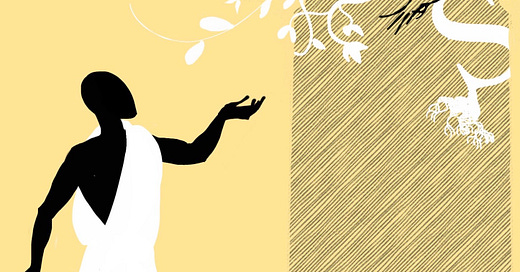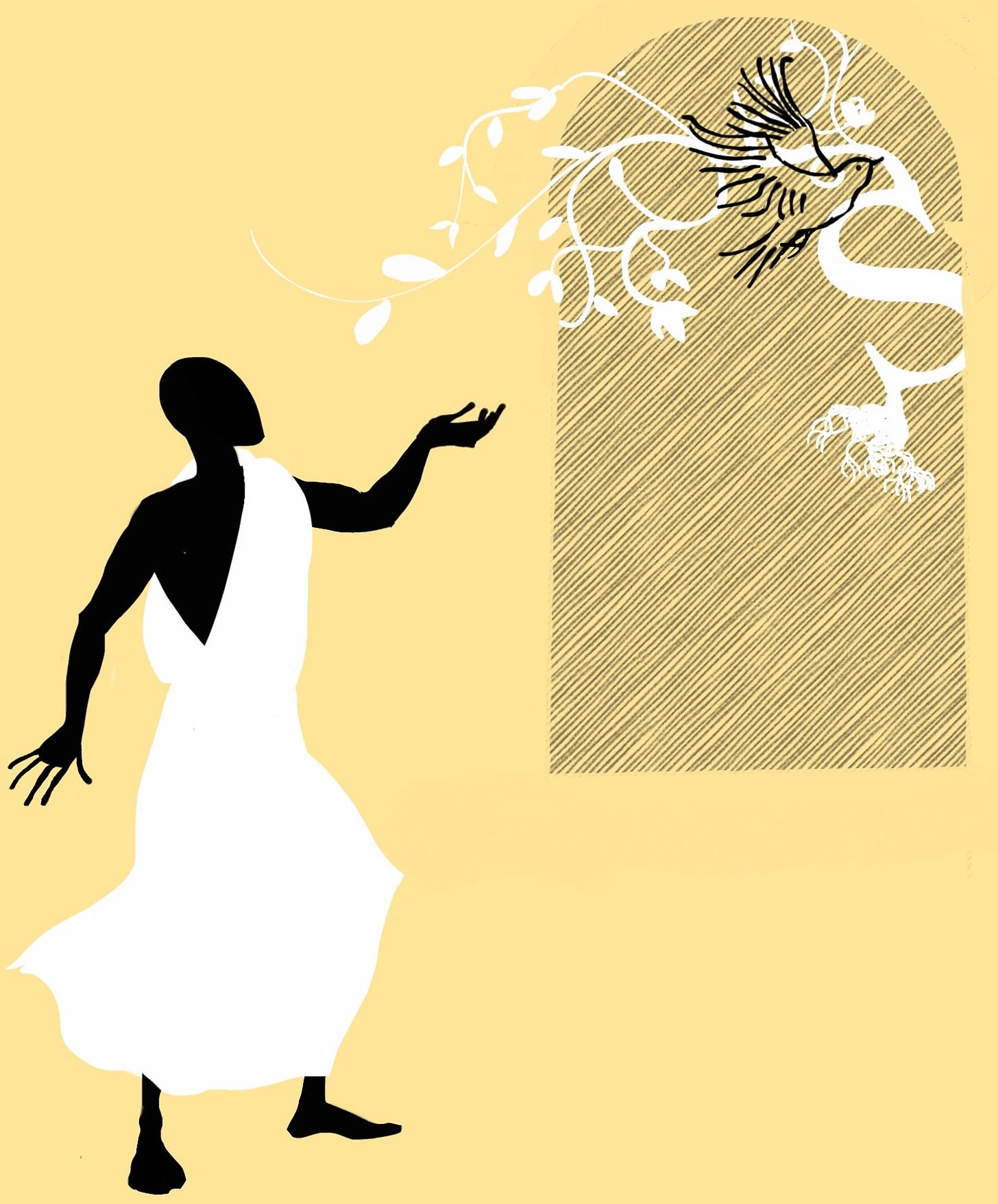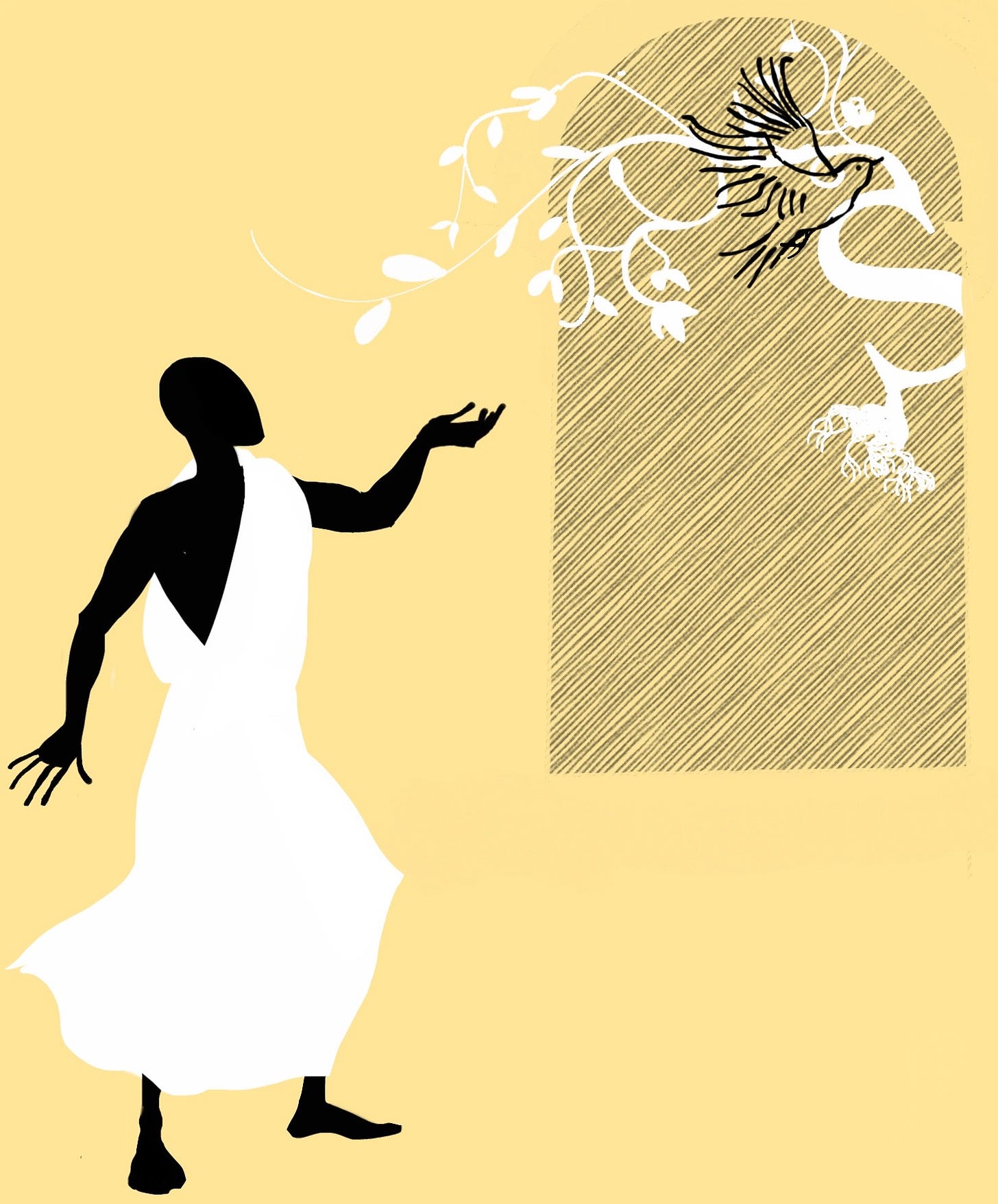“The idea that free speech perpetuates unequal power relations - and that restrictions on this freedom are needed to level the playing field - is deeply misguided. In fact, free speech may well be the most powerful engine of equality ever devised by humankind. Free speech is the difference between a political system where a joke or criticism of the political leader, ruling party or dominant religion results in a one-way ticket to some distant gulag and one where even the most powerful leader cannot punish the most powerless citizen for such irreverence.”
Welcome back to our new-look newsletter!
As I explained in our first Substack this week, the attack on Salman Rushdie shows us how severely free speech is under threat. We need to fight back against anyone who either makes light of the importance of this fundamental freedom, or pretends that there is no problem.
But we also need to win the argument for the value of free speech, and show why it matters today. During the lockdowns, we launched a series of publications called Letters on Liberty. Our aim was to keep a part of the public sphere alive, and capture some of the spirit of the tradition of radical pamphleteering from the seventeenth century onwards. Such pamphlets were designed to be argued over in the pub as much as parliament. In each Letter, we challenge an interesting thinker to remake the case for an area of freedom today.
One of my favourite essays we have published to date was Jacob Mchangama’s comprehensive defence of why free speech should matter to all of us. We asked Jacob to condense his essential book - Free Speech: A history from Socrates to Social Media - into a short pamphlet. You can read this essay below.
But, before you do, I want you to consider becoming a paid subscriber to this Substack. If you do, one of the key benefits is that we will send you the paper copies of these beautiful pamphlets each time we publish them. Not only are they great reads, and look brilliant on your desk or table, but they are perfectly sized to carry around and hand on to your friends or colleagues once you’ve read them. That way, you can carry on the spirit of radical pamphleteering and join us as we remake the case for freedom in the 21st Century!
THE FUTURE OF FREE SPEECH
by Jacob Mchangama
Imagine this: in 2030, freedom of expression enters its twenty-fifth consecutive year of global decline. During the preceding decade, the US Supreme Court reversed a half-century of American ‘free-speech exceptionalism’. In 2023, by a narrow five-to-four margin, Justice Clarence Thomas ordered an anti-Trump political group to pay damages for libel to Jared Kushner and Ivanka Trump after publishing negative attack adverts on Times Square billboards (1). The decision overturned the civil-rights era case of New York Times vs Sullivan (2), protecting speech critical of public officials and public figures. After winning a second term in 2024, President Donald Trump and his administration subsequently launched a crusade against the ‘fake-news media’ (3), and aggressively sued media organisations, political opponents and other critical voices.
During the last year of Joe Biden’s one-term presidency, a seven-to-six majority of the newly expanded Supreme Court (4) decided that even non-threatening online trolling of women and minorities can be punished as ‘fighting words’ (5). It also upheld a domestic terrorism act (6), aimed at far-right groups hoping to provoke a race war, which makes it unlawful to ‘knowingly conspire to teach and advocate the overthrow or destruction of the United States government’.
These precedents created a ripple effect. Legislatures in New York (7), Massachusetts, and California (8) passed laws that prohibit the infliction of ‘emotional distress’ by insulting a person on the basis of their race, skin colour, descent, national or ethnic origin, sexual orientation, gender, gender identity or religion. In addition to white supremacist and alt-right groups, these laws were also used to prosecute evangelical conservatives and supporters of tougher immigration laws (9). Public universities adopted elaborate speech codes, and students and faculty were regularly sanctioned for ‘offensive’ or ‘hateful’ speech (10).
Alabama, West Virginia, Oklahoma and Mississippi passed laws prohibiting the denigration of the Constitution, flag and founding values of the United States (11). They also enacted anti-anarchist laws making it a crime to advocate for governments to be overthrown by force or violence. These laws are used to ban or prosecute members of groups like Black Lives Matter, Antifa and the Council on American-Islamic Relations (12). Several chapters of the American Civil Liberties Union (ACLU) were prosecuted for providing ‘material assistance’ to proscribed groups (13). At southern universities, speech codes ensure proper respect for patriotic and traditional values, prohibiting courses that ‘distort’ Confederate history (14).
In a rare instance of bi-partisanship, Congress repealed Section 230 of the Communications Decency Act in 2022, removing the protection of online platforms against lawsuits arising from illegal content posted by their users (15). Hundreds of sites without the means to police all user content effectively, including Reddit, Wikipedia and Medium, folded under crippling libel suits from wealthy and powerful individuals and organisations.
“Imagine if Google and Facebook used artificial intelligence to automatically remove ‘harmful’ material without any recourse or oversight - before you could even post it.”
Facebook (now Meta) and Google, on the other hand, thrived. Combining artificial intelligence with their vast troves of intimate user data, these platforms developed sophisticated systems of Preventive Automated Content Moderation (PACM) (16). This allowed platforms to predict, detect, filter and remove ‘problematic’ content in real time before users could publish on platforms like Instagram and YouTube. This led to a sharp decline in political speech (which mostly consisted of users sharing news stories from traditional media outlets with few or no comments), whereas content featuring sports, entertainment and pets grew exponentially.
The implementation of PACM allowed Google and Meta access to the Chinese market - albeit with additional filtering to ensure compliance with China’s Great Firewall. PACM also ensured that Silicon Valley giants complied with the EU’s ‘digital sovereignty’ policy, under which all online platforms and service providers operating in the EU had to comply with ‘European values’ (17). This included a legal duty to proactively police illegal and harmful content such as hate speech, glorification of terrorism and disinformation. Following pressure and accusations of double standards from the Organisation of Islamic Cooperation, Meta, Twitter and YouTube agreed to filter ‘Islamophobia’, ensuring smoother relationships with governments in countries like Turkey, Pakistan and Iran (18).
Similarly, the EU adopted a directive on combating disinformation obliging member states to establish watchdogs to identify and order the removal of false information aimed at undermining public health and democratic values (19). After pressure from former communist states, the EU expanded its current prohibition against certain forms of Holocaust denial to cover the denial and glorification of the crimes of communism, which led to the banning of communist literature and symbols in much of Central and Eastern Europe (20).
In the UK, Boris Johnson’s Conservative government passed laws against advocating the boycott of Israel, as well as indirectly glorifying and condoning terrorism, which were used against pro-Palestinian activists and Muslim groups (21).
“Is it too far-fetched to imagine a future where JK Rowling is sentenced to six months in prison for her continued insistence that trans persons are not women?”
After winning the 2025 election, the UK Labour Party strengthened laws against religious hatred by reviving a previously defeated bill, making it a crime to insult the religious feelings of believers (22). These laws were used to ban or prosecute members of groups like the English Defence League and UKIP, but were also used to police heated discussions between LGBT+ activists and radical feminists (23). England, Wales and Scotland expanded the prohibition against ‘stirring up hatred’ (24).
In Scotland, author JK Rowling is sentenced to six months in prison for her continued insistence that trans persons are not women (25). Since the mere possession of hateful material is prohibited, several Scots are prosecuted for downloading and distributing a JK Rowling essay on gender issues.
Elsewhere in Europe, Dutch Prime Minister Geert Wilders delivered on his promise of banning the Quran (26). His government also copied Hungarian Prime Minister Viktor Orban’s law prohibiting NGOs from advocating ‘illegal immigration’ (27).
At the UN, a coalition of countries, spearheaded by China, Russia, Cuba and Saudi Arabia (and joined by Hungary and Poland) pushed through a change in international human-rights law subordinating freedom of expression to ‘traditional values’ in order to justify the repression of LGBT+ communities and to silence criticism of cultural and religious traditions (28).
The free-speech recession
Does this scenario sound far-fetched? If so, it is only because we are lucky enough to live at a time where free speech is taken for granted in democracies, and instant access to ubiquitous speech is but a click away. But free speech is far from assured; it has not been the default position in the long arc of history. Thus, after decades of global gains, it has now suffered more than a decade of setbacks (29).
In fact, each of the hypothetical scenarios that make up the future scenario described above are based on recent developments such as proposed laws, statements from politicians, opinion polls or actual laws that are or used to be in force.
Accordingly, the future dystopia may be closer to reality than science fiction should the free-speech recession continue unabated. This would constitute a tragic development in human affairs. Free speech is one of the most powerful and transformative ideas ever conceived. It is hailed as the ‘first freedom’, the bedrock of democracy, the enemy of tyranny, the midwife of enlightenment and the source of truth.
“The right to open discourse is far more fragile than it might seem to those who casually rely upon it.”
These claims are not mere hyperbole. Freedom of speech is strongly correlated with democratic governance, human rights, gender equality (30) and innovation (31). While freedom of speech has its costs and can be used to inflict serious harm, this freedom actually tends to lower levels of violent conflict (32) and terrorism (33).In essence, a commitment to free speech and its ideals of peaceful discussion of passionate disagreements, with a view to pragmatic political compromise, is the very antithesis to violence.
For all its benefits, freedom of speech is also counterintuitive. In democracies, many have come to see certain free-speech practices as tools for the powerful to marginalise minorities and the powerless. Elites in political and media institutions point to unmediated disinformation and hate speech on social media and argue that free speech is being ‘weaponised’ against democracy itself. Outside democracies, free speech is being crushed by the combination of authoritarian strongman populism, religious fundamentalism and sophisticated technology reverse-engineered to undermine the initial promise of the internet - free and equal speech for all.
Add to this the emergence of dominant global tech giants, who raise the spectre of ‘moderation without representation’, where private corporate behemoths make centralised decisions on the limits of global debates with little transparency or accountability. The right to open discourse is therefore more fragile than it might seem to those who casually rely upon it. Unless this free-speech recession is reversed, we may be entering a new high-tech dark-age.
This poses the question of whether free speech can withstand a global assault on both its legal and cultural foundations. Anyone who believes that a future with less free speech is something to celebrate rather than fear should look to the ongoing autocratisation in Hong Kong, Hungary and India - where dissent is being systematically quashed. These modern developments confirm emphatically what the British writer Thomas Gordon stated so eloquently in 1721, in one of history’s most influential writings on free speech:
‘Freedom of speech is the great bulwark of liberty... Whoever would overthrow the liberty of the nation, must begin by subduing the freedom of speech.’ (34)
Whatever fundamental reforms are needed to ensure that humans can thrive, trust and flourish in the digital age, a robust commitment to free speech should be recognised as a necessary part of the solution, rather than an outdated ideal to be discarded on the ash heap of history.
Why democracies need free speech
Free speech still serves as the bulwark of liberty, the foundation of democracy, equality, autonomy - and yes, even the pursuit of truth. In established democracies, these benefits are largely invisible, since we take them for granted while the harms and pathologies are more visible than ever. But it is surely instructive that embattled pro-democracy activists in Hong Kong, Belarus, Russia, Myanmar, Egypt and Venezuela depend on the ability to communicate and organise their activities on digital networks outside government control, while the regimes of these countries view the open internet as an existential threat to their survival.
To demonstrate this point, it is instructive to compare the US and Russia. Until recently, both had illiberal presidents willing to subvert the rule of law and democratic norms. Trump lasted one term as US president after being subjected to relentless and severe criticism, thwarted by the courts in his attempts to sue and silence critics and the media. Russia’s Putin has been in power since 2000, all the while using state power to kill and imprison journalists, censor independent media and the internet as well as turning traditional media into his pliant mouthpieces. When Alexei Navalny challenged Putin’s rule, he was poisoned and then imprisoned after a Star Chamber trial in a kangaroo court.
Sure, Trump frequently fantasised about locking up his opponents, but the First Amendment and a culture of free speech underpinned by independent institutions made him powerless to do so. If the First Amendment helped Trump win office, it was also instrumental in removing him from it. On the other hand, the absence of free speech in Russia has been a key component in Putin’s long and obsessive stranglehold on Russian politics.
More broadly, the idea that free speech perpetuates unequal power relations - and that restrictions on this freedom are needed to level the playing field - is deeply misguided. In fact, free speech may well be the most powerful engine of equality ever devised by humankind. Free speech is the difference between a political system where a joke or criticism of the political leader, ruling party or dominant religion results in a one-way ticket to some distant gulag and one where even the most powerful leader cannot punish the most powerless citizen for such irreverence.
“Free speech may well be the most powerful engine of equality ever devised by humankind.”
Allowing one group to punish the ideas of others doesn’t equalise unequal power relations, it inverts them - ultimately creating new structures of oppression rather than abolishing them altogether. Christians were once a small and persecuted sect. But once Christianity became the state religion of the Roman Empire, the Church and Christian rulers turned the tables and persecuted both pagans and heretics.
Socialists and communists were hounded and censored in much of Europe prior to the Russian Revolution. Yet when the Bolsheviks grabbed political power, there was no room for dissent in the dictatorship of the proletariat, whose leaders persecuted not only ‘enemies of the people’ but the entire people in whose name Lenin and Stalin claimed to govern. Many an advocate of national self-determination was tried and convicted by British colonial-era laws against sedition and enmity. Today, British colonialism might have been dislodged, but colonial-era speech crimes have been left in place and even recycled to shield the new rulers from the people whom decolonisation was supposed to liberate.
The balance of power
There are, of course, dilemmas as to when and how democracies should react to movements who threaten to overthrow democracy. A robust commitment to free speech should be accompanied with a zero-tolerance policy towards organised threats, intimidation and violence by groups seeking to establish parallel systems of authority. Groups of thugs and armed militias policing the streets to challenge democratic institutions and enforce vigilante justice against ideological enemies are a clear and present danger to both democracy and free speech. As Spinoza, Mill and Orwell warned, societal threats to free speech can be as stifling as government-imposed censorship. Yet, determining whether private action undermines or is an exercise of the culture of free speech can be difficult. After all, free speech does not grant anyone the right to have an op-ed published in the New York Times or a huge following on social media. Still, there is a fundamental difference between reacting to ideas one loathes with scorn or criticism, and demanding that specific viewpoints be purged and their authors and enablers punished with loss of livelihood or disciplinary sanctions.
Influential educational and cultural institutions, however committed to liberal and progressive values, do not become more diverse, tolerant and equal by banishing ideas, publications or speakers that do not conform to the prevailing orthodoxy.
“It is up to each of us to defend a culture tolerant of heretical ideas”
It is particularly problematic when media institutions, social-media platforms and universities - who cannot function without free speech - come to internalise the idea that provocative opinions are ‘dangerous’, ‘unsafe’ or even ‘harmful’ to their own staff, students, readers or users. Such arguments were used to purge Pierre Bayle from the University of Rotterdam for his scepticism in the late seventeenth century. Academics critical of slavery and US participation in the First World War were fired at elite American universities in the nineteenth and twentieth centuries, after concerted campaigns by fellow academics and the press. There is good reason to believe that today’s online inquisitions scouring social media for twenty-first-century Cathars and Conversos will be seen as a regressive rather than a progressive force by future generations.
Eternal vigilance against both encroaching state power and the opaque, automated, centralised, privatised control of speech will be required for free expression to fulfil its promise as a necessary precondition for democracy, freedom and equality.
Most important for the future of free speech is that those of us who have benefitted from the unprecedented advances in human affairs that 2,500 years of this counterintuitive, revolutionary idea have helped bring about must resist the force of free-speech entropy. It is up to each of us to defend a culture tolerant of heretical ideas, use our system of ‘open vigilance’ to limit the reach of disinformation, agree to disagree without resorting to harassment or hate, and treat free speech as a principle to be upheld universally - rather than a prop to be selectively invoked for narrow, tribalist point-scoring. To quote George Orwell:
‘If large numbers of people are interested in freedom of speech, there will be freedom of speech, even if the law forbids it; if public opinion is sluggish, inconvenient minorities will be persecuted, even if laws exist to protect them.’ (35)
This Letter is based on Jacob Mchangama’s book, Free Speech: a history from Socrates to social media, published by Basic Books.
About the author
Jacob Mchangama is a lawyer, human-rights advocate and former external lecturer in human rights at the University of Copenhagen. He is the founder and director of Justitia, a Copenhagen-based think tank focusing on human rights, freedom of speech and the rule of law. His writings have appeared in a wide range of international outlets. His new book is called Free Speech: a global history from Socrates to social media and is published by Basic Books. Free Speech builds on his podcast Clear and Present Danger: a history of free speech, which has reached an audience of over 220,000 unique listeners in more than 120 countries across the world
References
Folley, Aris, ‘Lincoln Project attorney on billboards lawsuit threat: “please peddle your scare tactics elsewhere”’, The Hill, 25 October 2020
Liptak, Adam, ‘Justice Clarence Thomas calls for reconsideration of landmark libel ruling’, New York Times, 19 February 2019
Gershman, Jacob, ‘Trump’s campaign’s libel claims are long shots’, Wall Street Journal, 6 March 2020
Kapur, Sahil, ‘Kamala Harris says she’s open to expanding Supreme Court’, Bloomberg, 15 May 2019 v
Bitzer, Michael, ‘Chaplinksy v. New Hampshire (1942)’, The First Amendment Encyclopedia, 2009
Macfarquhar, Neil, ‘As domestic terrorists outpace jihadists, new US law is debated’, New York Times, 25 February 2020
Knoernschild, Kaelynn, ‘New York Senate passes bill to restrict “hate speech” at universities’, Student Press Law Center, 6 July 2016
Ting, Eric, ‘Poll: over half of Calif. Democrats in favour of free speech restrictions’, SFGATE, 13 September 2017
Ekins, Emily, ‘The state of free speech and tolerance in America’, Cato Institute, 31 October 2017
‘Spotlight on Speech Codes 2022: the state of free speech on our nation’s campuses’, FIRE, 2022
Ekins, Emily, ‘The state of free speech and tolerance in America’ 17
Haberman, Maggie and Savage, Charlie, ‘Trump, lacking clear authority, says US will declare Antifa a terrorist group’, New York Times, 31 May 2020
‘Supreme Court rules “material support” law can stand’, ACLU, 21 June 2010
Snyder, Timothy, ‘The war on history is a war on democracy’, New York Times Magazine, 29 June 2021
Guynn, Jessica, ‘Trump vs big tech: everything you need to know about Section 230 and why everyone hates it’, USA Today, 15 October 2020
Gagliordi, Natalie, ‘Facebook says AI enhancements have bolstered its content moderation efforts’, ZDNet, 11 August 2020
Propp, Kenneth, ‘Coronavirus spurs Europe’s quest for digital sovereignty’, New Atlanticist, 22 April 2020
Peshimam, Gibran Naiyyar, ‘Pakistan’s PM takes aim at Macron; asks Facebook to ban Islamophobic content’, Reuters, 25 October 2020
Khan, Mehreen, ‘EU to threaten tech regulation over spread of “fake news”’, Financial Times, 12 April 2018
‘EU won’t legislate on communist crimes’, BBC, 22 December 2010
Stone, Jon, ‘Banning boycotts of Israel will protect Britain’s national security, government says’, Independent, 17 February 2016
‘Ministers lose religious bill bid’, BBC, 1 February 2006
Stevens, John and Walsh, Joani, ‘Labour feminist who took on the party’s trans activists is questioned by police’, Daily Mail, 4 May 2018
‘Ministers lose religious bill bid’, BBC News, 1 February 2006
‘Why is Scotland’s Hate Crime Bill so controversial?’, BBC, 15 December 2020
‘Ban the Koran in the Netherlands, says far-right leader Wilders’, Euronews, 5 March 2017
Than, Krisztina, ‘Hungary aims to criminalise aiding illegal migration in “Stop Soros” bill’, Reuters, 29 May 2018
Murphy, Maggie, ‘Traditional values vs human rights at the UN’, openDemocracy, 18 February 2013
‘Democracy Index 2019’, The Economist Intelligence Unit, 2019
Mchangama, Jacob, ‘The feminist case for free speech’, Quillette, 12 March 2018
Dittmar, Jeremiah E, ‘Information Technology and Economic Change: the impact of the printing press’, The Quarterly Journal of Economics, vol 126, issue 3, 2011
Mchangama, Jacob, ‘Data about free speech and violence’, Cato Unbound, 22 June 2018
Eskildsen, Lasse and Bjørnskov, Christian, ‘Does freedom of expression cause less terrorism?’, 5 April 2020
Gordon, Thomas, ‘Of freedom of speech: that the same is inseparable from publick liberty’, reprinted by FIRE, 4 February 1721
Orwell, George, ‘Freedom of the park’, Tribune, 7 December 1945







